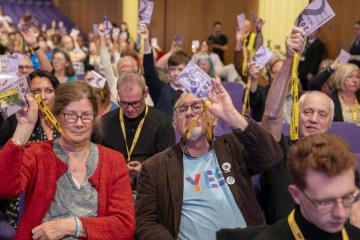A significant political rebellion is brewing within the Scottish National Party, as a substantial faction challenges First Minister John Swinney’s established SNP political strategy for achieving Scottish independence. This internal dissent highlights a growing impatience among grassroots members, who are seeking a more assertive and direct pathway to sovereignty.
Documents recently revealed indicate that at least 43 regional branches have officially endorsed an alternative motion, setting the stage for crucial discussions before the party’s autumn national conference. This rival blueprint directly contrasts with the First Minister’s more conventional approach, underscoring a deep division over the most effective route forward for the independence movement.
The core of the rebel proposal centers on the upcoming 2026 Scottish election. It posits that if pro-independence parties secure a majority of ‘list votes’ in that election, it should automatically grant a mandate to initiate UK government negotiations for independence. This bold stance bypasses the traditional demand for a specific referendum, advocating instead for a mandate derived directly from electoral success.
Proponents of this new strategy are not merely advocating for negotiations; they explicitly state that if these discussions fail, the next step would be to “dissolve the union,” asserting the legality and practicality of such a move. This uncompromising position reflects a frustration with past processes and a determination to achieve independence through direct action if conventional routes prove ineffective.
The rebel group is slated to convene in Perth on August 9th, where they will formalize their plans and strategize for the SNP conference. The widespread backing from regional branches demonstrates a significant groundswell of support, suggesting this is not an isolated fringe movement but a considerable force capable of influencing the party’s future direction.
A key tenet of their argument is the rejection of continuously “asking for referenda” or seeking permission from Westminster. This marks a decisive shift from previous SNP political strategy, signaling an end to what they perceive as subservience to the UK Government. The rebels are convinced that the time for polite requests is over, and a more robust approach is necessary.
Internal party sources supporting the motion believe that the absence of recent independence-focused resolutions on the conference agenda is deliberate, pushing for their alternative to be heard and debated. This internal struggle reveals the dynamic tensions within the party as it grapples with its core objective amidst fluctuating public and electoral support.
Echoing parts of the rebel sentiment, Greens co-leader Lorna Slater highlighted the broader consensus that the UK framework hinders Scotland’s progress. She emphasized that while the SNP might face polling challenges, support for Scottish independence remains resilient, underscoring the importance of cross-party recognition for achieving this national goal.
The momentum building behind this alternative plan, particularly concerning the 2026 Scottish election and future UK government negotiations, signals a pivotal moment for the SNP. This political rebellion at the grassroots level suggests that the party’s long-term SNP political strategy for Scottish independence is under intense scrutiny and could be dramatically reshaped in the coming months, marking a significant development for John Swinney’s leadership.






Leave a Reply